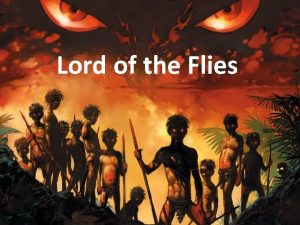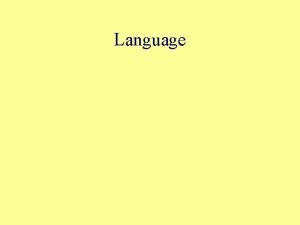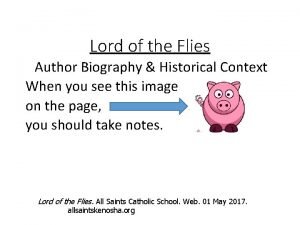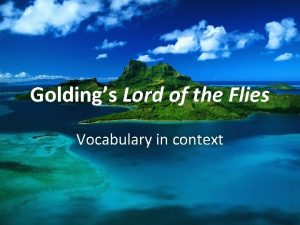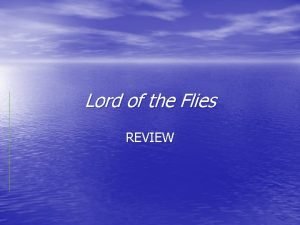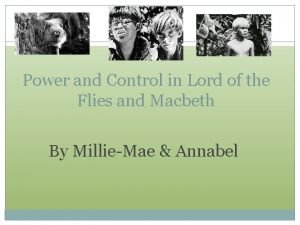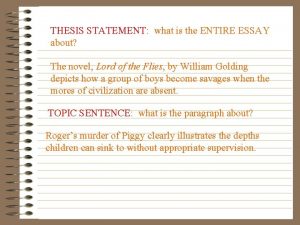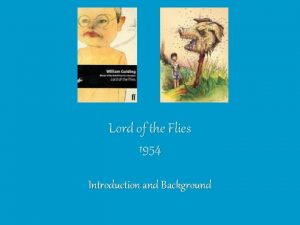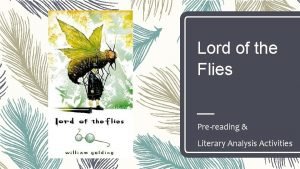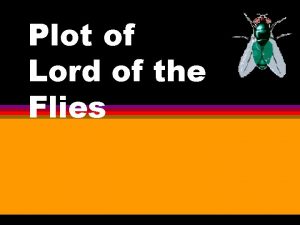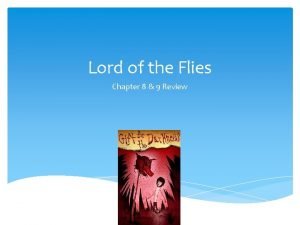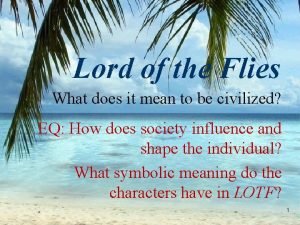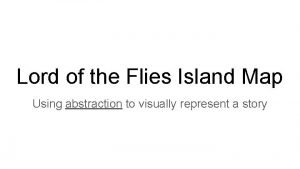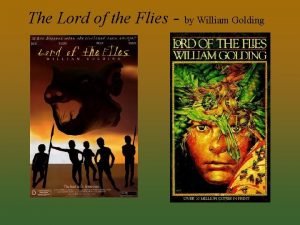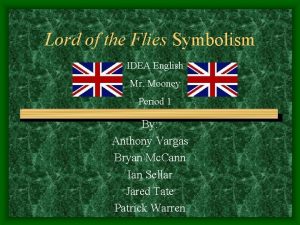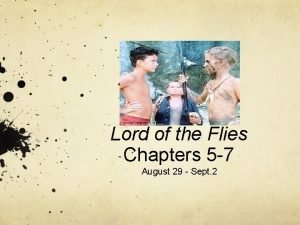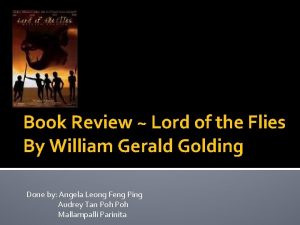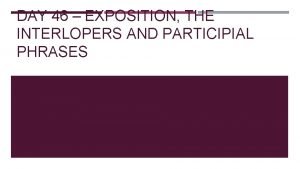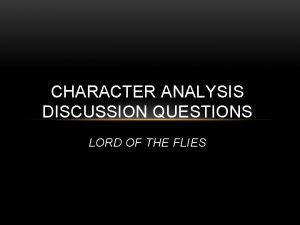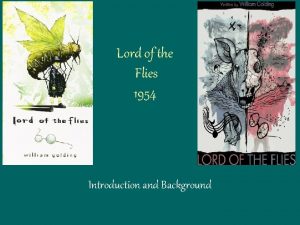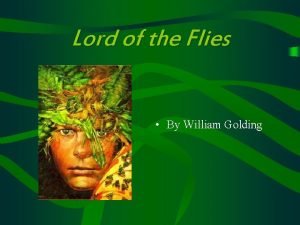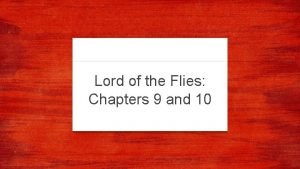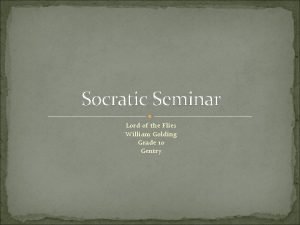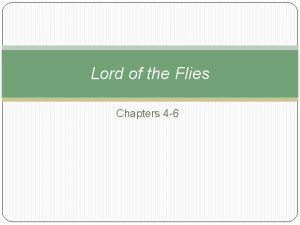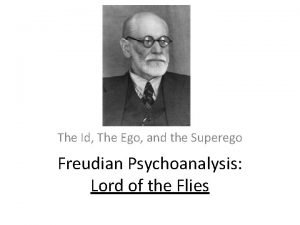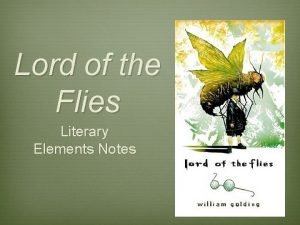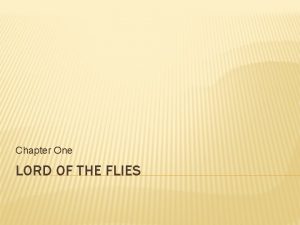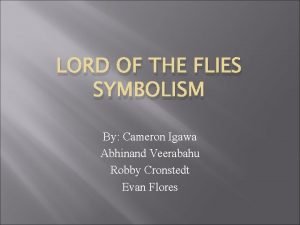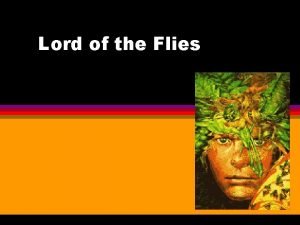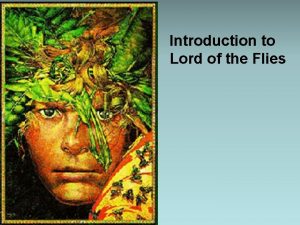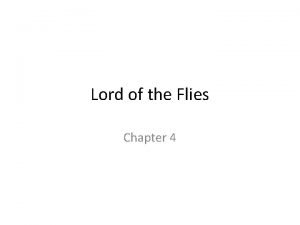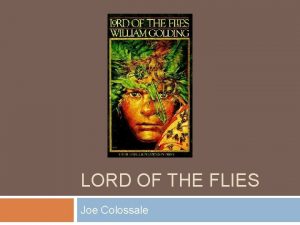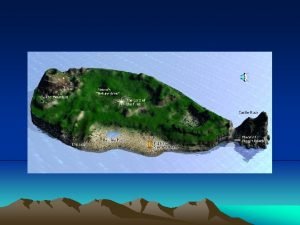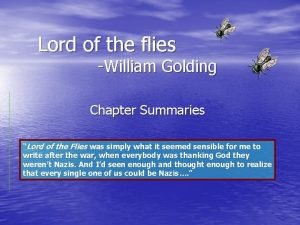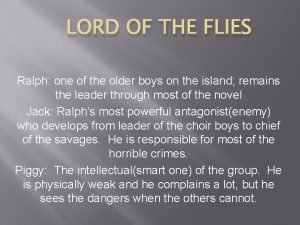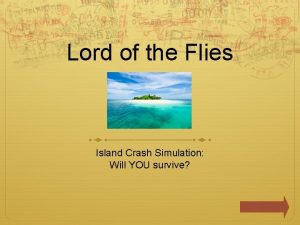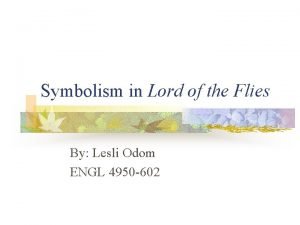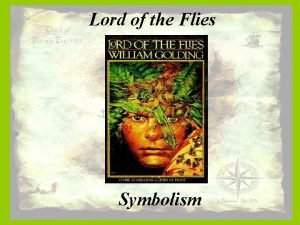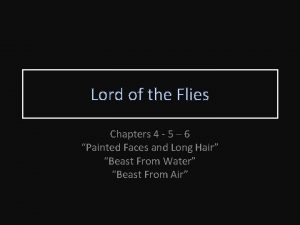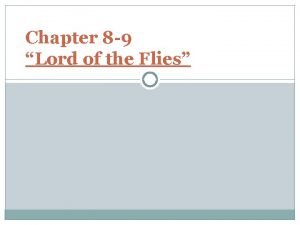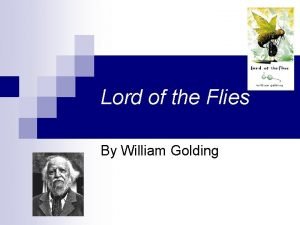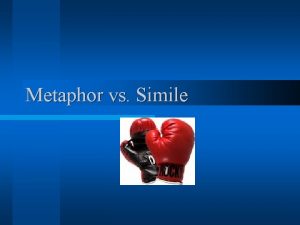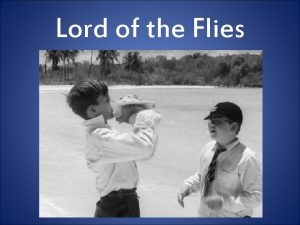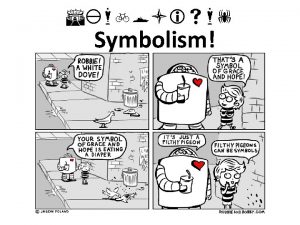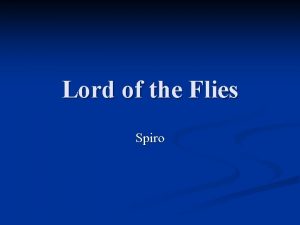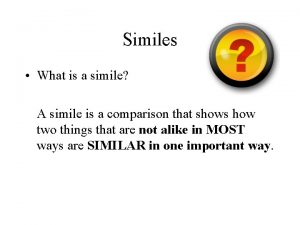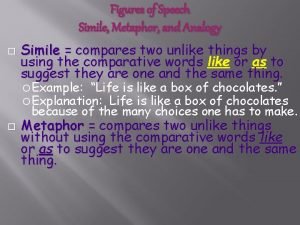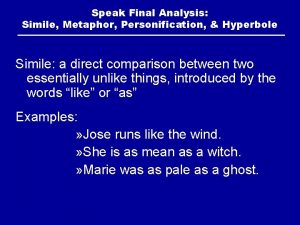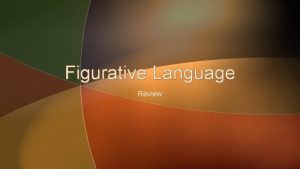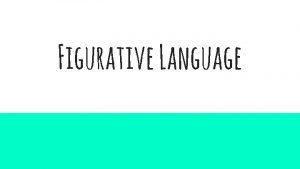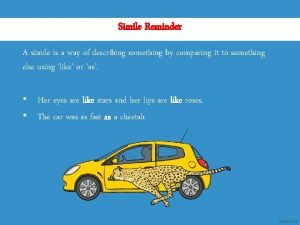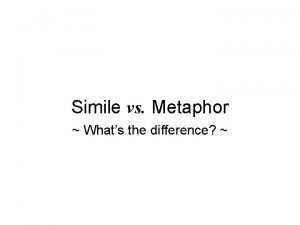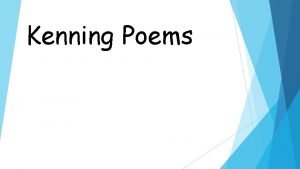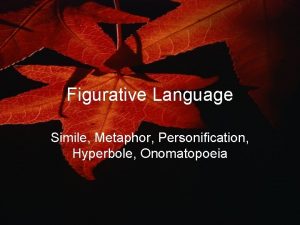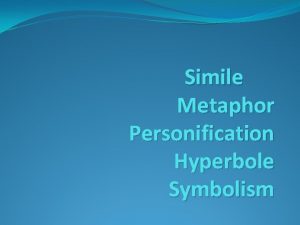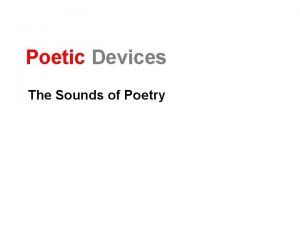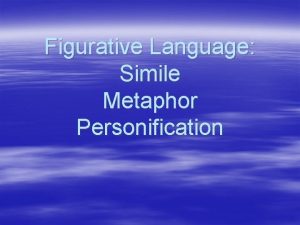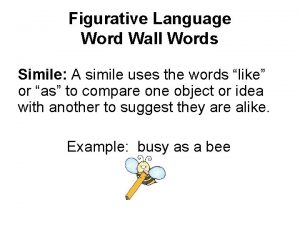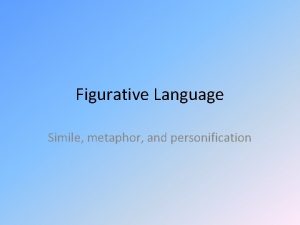Lord of the Flies simile S M P










































- Slides: 42

Lord of the Flies

simile S M P A O I R Write these letters in your book. Next to each, write down as many language techniques as you can that begin with this letter. An example has been given to get you started.

Possible answers: S M P A O I R • Similes • Metaphors • Personification • Alliteration • Sibilance • Onomatopoeia • Irony • Repetition In pairs, write a definition of each of these terms, then give an example.

“You said you wanted a small fire and you been and built a pile like a hayrick. If I say anything, ” cried Piggy, with bitter realism, “you say shut up; but if Jack or Maurice or Simon–” He paused in the tumult, standing, looking beyond them and down the unfriendly side of the mountain to the great patch where they had found dead wood. Then he laughed so strangely that they were hushed, looking at the flash of his spectacles in astonishment. They followed his gaze to find the sour joke. “You got your small fire all right. ” Smoke was rising here and there among the creepers that festooned the dead or dying trees. As they watched, a flash of fire appeared at the root of one wisp, and then the smoke thickened. Small flames stirred at the trunk of a tree and crawled away through leaves and brushwood, dividing and increasing. One patch touched a tree trunk and scrambled up like a bright squirrel. The smoke increased, sifted, rolled outwards. The squirrel leapt on the wings of the wind and clung to another standing tree, eating downwards. Beneath the dark canopy of leaves and smoke the fire laid hold on the forest and began to gnaw. Acres of black and yellow smoke rolled steadily toward the sea. At the sight of the flames and the irresistible course of the fire, the boys broke into shrill, excited cheering. The flames, as though they were a kind of wild life, crept as a jaguar creeps on its belly toward a line of birch-like saplings that fledged an outcrop of the pink rock. They flapped at the first of the trees, and the branches grew a brief foliage of fire. The heart of flame leapt nimbly across the gap between the trees and then went swinging and flaring along the whole row of them. Beneath the capering boys a quarter of a mile square of forest was savage with smoke and flame. The separate noises of the fire merged into a drum-roll that seemed to shake the mountain. “You got your small fire all right. ” Startled, Ralph realized that the boys were falling still and silent, feeling the beginnings of awe at the power set free below them. The knowledge and the awe made him savage.

SECTION A: READING Q 4 20 marks 4 marks Q 1 Read the text Q 2 8 marks Q 3

AO 1: Identify and interpret explicit and implicit information and ideas. Select and synthesise evidence from different texts. AO 2: Explain, comment on and analyse how writers use language to achieve effects and influence readers, using relevant subject terminology to support their views

Read again the first part of the source, lines 7 to 13. List four things from this part of the text about the fire. [4 marks]

Q 1: List four things from this part of the text about the fire. Smoke was rising here and there among the creepers that festooned the dead or dying trees. As they watched, a flash of fire appeared at the root of one wisp, and then the smoke thickened. Small flames stirred at the trunk of a tree and crawled away through leaves and brushwood, dividing and increasing. One patch touched a tree trunk and scrambled up like a bright squirrel. The smoke increased sifted, rolled outwards. The squirrel leapt on the wings of the wind and clung to another standing tree, eating downwards. Beneath the dark canopy of leaves and smoke the fire laid hold on the forest and began to gnaw. Acres of black and yellow smoke rolled steadily toward the sea.

• • • Responses must be drawn from lines 7 -13 of the text Responses must be true statements from the extract Responses must relate to the fire Candidates may quote or paraphrase – each is acceptable A paraphrased response covering more than one point should be credited for each point made.

Responses can include but are not restricted to: The fire is described as ‘small’ – a ‘flash’ to start off The fire generates ‘smoke’ It started to become powerful and spread across the forest as ‘smoke increased’ and it ‘laid hold of the forest’ • The fire is quick- it’s described as a ‘squirrel’ leaping on the ‘wings of the wind’ from tree to tree • It spreads through the forest- ‘crawls’ on the forest floor • It is destructive ‘gnaws’. • •

Look in detail at this extract from lines 7 to 19 of the source. How does the writer use language here to describe the effects of the fire? [8 marks] You could include the writer’s choice of: • words and phrases • language features and techniques • sentence forms

Can you identify the language devices used below? The cotton wool clouds floated carelessly The teacher was as angry as a bear He wore his heart on his sleeve The wind screamed through the trees 1. Write each example in your book. 2. Underline and identify the technique used. 3. Annotate each example with an idea about the effect of each technique.

Now read the text again. Identify and annotate any language techniques you find, making sure you comment on the effect of each one.

Q 2: How does the writer use language here to describe the effects of the fire? Smoke was rising here and there among the creepers that festooned the dead or dying trees. As they watched, a flash of fire appeared at the root of one wisp, and then the smoke thickened. Small flames stirred at the trunk of a tree and crawled away through leaves and brushwood, dividing and increasing. One patch touched a tree trunk and scrambled up like a bright squirrel. The smoke increased, sifted, rolled outwards. The squirrel leapt on the wings of the wind and clung to another standing tree, eating downwards. Beneath the dark canopy of leaves and smoke the fire laid hold on the forest and began to gnaw. Acres of black and yellow smoke rolled steadily toward the sea. At the sight of the flames and the irresistible course of the fire, the boys broke into shrill, excited cheering. The flames, as though they were a kind of wild life, crept as a jaguar creeps on its belly toward a line of birch-like saplings that fledged an outcrop of the pink rock. They flapped at the first of the trees, and the branches grew a brief foliage of fire. The heart of flame leapt nimbly across the gap between the trees and then went swinging and flaring along the whole row of them. Beneath the capering boys a quarter of a mile square of forest was savage with smoke and flame. The separate noises of the fire merged into a drum-roll that seemed to shake the mountain.

Q 2: How does the writer use language here to describe the effects of the fire? Q W E R T Y Golding employs a range of language devices to engage the reader. At the start of the piece the fire is described as a ‘flash of fire’ which suggests that it is small and insignificant. However, as the paragraph develops the fire ‘scramble[s] up like a bright squirrel’. The simile use is effective as the reader is able to visualise how the fire is moving rapidly from tree to tree on the ‘wings of the wind’ the use of personification also allows the reader to create mental images of how the fire is almost flying across the air and gains ground, becoming more powerful.

Look in detail at this extract from lines 7 to 19 of the source. How does the writer use language here to describe the effects of the fire? [8 marks] You could include the writer’s choice of: • words and phrases • language features and techniques • sentence forms

WWW/EBI Peer assess each other’s work, marking WWW/EBI onto the text as you read. What band would you award for this answer?

You now need to think about the whole of the source. This text is from Chapter Two in Lord of the Flies. How has the writer structured the text to interest you as a reader? [8 marks] You could write about: • what the writer focuses your attention on at the beginning • how and why the writer changes this focus as the extract develops • any other structural features that interest you.

Q 3: How has the writer structured the text to interest you as a reader? In pairs, re-read the text and highlight all the short snappy sentences the writer uses when describing the fire. Look at when and where these short sentences are used and what the effect of these sentences is. Now look around them: are there any longer, more complex sentences nearby? How is the text structured? What might these sentences suggest about the fire? How does this interest us as a reader? See if you can identify: • Complex sentences which create pace and reflect the speed of the fire • Short, simple sentences to reflect the cracking, sudden movements of the fire • Compound sentences to highlight the fire’s longevity and perseverance

Q 3: How has the writer structured the text to interest you as a reader? Now think about how punctuation is used for effect. In pairs, highlight all the parts of the text where punctuation is deliberately used for effect. See if you can find and comment on: • the impact of the dash • the way direct speech is highlighted • repeated use of commas for pace • the absence of punctuation in some sentences to show the fire is uncontrollable

Q 3: How has the writer structured the text to interest you as a reader? Now let’s think about how the text develops – and why. • What impact does this structure have? • How does it engage the reader? • How does it guide us through the text?

Q 3: How has the writer structured the text to interest you as a reader? dialogue description comment from Piggy more description repeated comment from Piggy inside Ralph’s head

Q 3: How has the writer structured the text to interest you as a reader? Now let’s think about how the text develops – and why. • What impact does this structure have? • How does it engage the reader? • How does it guide us through the text?

You now need to think about the _____ of the source. This text is from Chapter Two in Lord of the Flies. How has the writer _______ the text to _______ you as a reader? [ ____ marks] You could write about: • what the writer focuses your attention on at the ____ • how and _____ the writer changes this focus as the extract develops • any other _______ features that interest you.

You now need to think about the whole of the source. This text is from Chapter Two in Lord of the Flies. How has the writer structured the text to interest you as a reader? [8 marks] You could write about: • what the writer focuses your attention on at the beginning • how and why the writer changes this focus as the extract develops • any other structural features that interest you.

Q 3: How has the writer structured the text to interest you as a reader? Q W E R T Y Golding starts the piece off with lively dialogue; Piggy expresses his annoyance at Ralph; “You said you wanted a small fire and you been and built a pile like a hayrick. If I say anything, ” cried Piggy, with bitter realism, “you say shut up; but if Jack or Maurice or Simon–” However, he pauses and the dash indicates the dramatic pause, as if he is distracted, and he does not elaborate. The dramatic pause indicates to the reader that he is noticing something and that something is wrong. In addition, the fact that he does not provide any other information adds to the tension of what he is to reveal next and grips the reader’s attention.

You now need to think about the whole of the source. This text is from Chapter Two in Lord of the Flies. How has the writer structured the text to interest you as a reader? [8 marks] You could write about: • what the writer focuses your attention on at the beginning • how and why the writer changes this focus as the extract develops • any other structural features that interest you.

WWW/EBI Peer assess each other’s work, marking WWW/EBI onto the text as you read. What band would you award for this answer?

SECTION A: READING Q 4 20 marks 4 marks Q 1 Read the text Q 2 8 marks Q 3

Based on everything we have discussed so far… what makes this an interesting piece of writing? as in w k in h 1. What does ‘interesting’ or ‘exciting’ mean t u o y t a h w n o nswer: you focus A t x e t e h T. g the context of anoexam question about readers’ in it c x e r o ing t s e r e t in e b t d e s o p p u s reactions? een chosen for a reason. There has to be has b f o e id s t u o e v o m o t Try ! t u o b a e it r w o t g in h t some ut o b a k in h t d n a s e c n e r fe al preyourself, 2. What don’t finding, onyou, ersif wn pdo ur oyou yodo t s e r e t in d n fi t h ig m e c n udie‘interesting’ er atext at a wid anything the ? sting… or whabout e r e t in o be t t n a e m r e it r w e h t t a wh ! g in t s e r e t in is s k in h t d oar b m a x e e h t t a h w n e v e

Bearing this in mind… Skim through the text one more time, highlighting all the images that make the piece exciting.

Question 4: A student, having read this section of the text said: “The writer brings the very different characters to life for the reader. It is as if you are on the island with them. ” To what extent do you agree? In your response, you should: • write about your own impressions of the characters • evaluate how the writer has created these impressions • support your opinions with quotations from the text.

Q 4: To what extent do you agree?

CLEAR RELEVANT EVALUATION What do these words mean? What does an examiner expect from a L 3 candidate?

PERCEPTIVE DETAILED EVALUATION What do these words mean? What does an examiner expect from a L 4 candidate?

Bearing this in mind… Skim through the text one more time, highlighting all the images that make the piece exciting. o t s r e w s n a r u o y o t Go back r o e v o r p im u o y n this task. Ca w o n m e h t o t g in h add anyt 3 L e h t t a d e k o lo that you have and L 4 criteria?

Question 4: ! s t in o p t e ll u b e Don’t ignore th n i 3 2 A student, having read this section of the h it w p u e m o c Try to h c a e g text said: “The writer brings the very in s s e r d d a , s depth idea e it r w different characters to life for the reader. It u o y n e h w t in o p t e bull is as if you are on the island hem. them. ” To about twith what extent do you agree? In your response, you should: • write about your own impressions of the characters • evaluate how the writer has created these impressions • support your opinions with quotations from the text.

In pairs, try to come up with an idea you could write about … for example: Impressions of the characters: Ralph is angry and frustrated that the boys are so easily excited by the fire. How the writer has created this impression: The extract ends with Ralph’s response to the boys’ cheering the fire. He is ‘startled’ but also ‘savage’. Evidence to support this idea: “The knowledge and the awe made him savage. ”

Now look at your idea. Remember that you are being asked to evaluate, so don’t just present the examiner with the obvious. Reflect on why ideas are presented in a certain way. Develop your ideas in more detail by digging in to your quote, considering what the reader is learning from each of these points and quotes. You can comment on language and on structure in your answer.

Q 4: To what extent do you agree? Q W E R T Y Golding shows the reader that Ralph realises that the boys are mesmerised by the fire and ‘[t]he knowledge and the awe made him savage. ’ The fact that the boys are so easily distracted and impressed by the wrong things frustrates him. He is disappointed that they are impressed by the fire (‘excited cheering’) rather than horrified by the consequences of their actions; the adjective ‘savage’ suggests that he is furious at them, revealing a dark side to his personality as well as a moral outrage that the boys are cheering the fire. On the other hand, ‘startled’ shows us that he did not expect this and was taken by surprise. That this happens at the end of the extract, focuses us on Ralph’s reaction and makes it important, bringing him to life for the reader.

Question 4: A student, having read this section of the text said: “The writer brings the very different characters to life for the reader. It is as if you are on the island with them. ” To what extent do you agree? In your response, you should: • write about your own impressions of the characters • evaluate how the writer has created these impressions • support your opinions with quotations from the text.

Q 4: To what extent do you agree? WWW/EBI Peer assess each other’s work, marking WWW/EBI onto the text as you read. What band would you award for this answer?
 Lord of the flies similes
Lord of the flies similes Ambiguities definition
Ambiguities definition Lord of the flies author
Lord of the flies author Corpulent definition lord of the flies
Corpulent definition lord of the flies Lord of the flies christian review
Lord of the flies christian review Power in lord of the flies
Power in lord of the flies Thesis statement for lord of the flies
Thesis statement for lord of the flies Lord of the flies background
Lord of the flies background Ego defense mechanisms in lord of the flies
Ego defense mechanisms in lord of the flies Plot of lord of the flies
Plot of lord of the flies Lord of the flies summary chapter 9
Lord of the flies summary chapter 9 Guano definition lord of the flies
Guano definition lord of the flies Lotf map of island
Lotf map of island William golding tentang wanita
William golding tentang wanita Scar definition lord of the flies
Scar definition lord of the flies Complex sentence in lord of the flies
Complex sentence in lord of the flies Lord of the flies important scenes
Lord of the flies important scenes The interlopers plot chart
The interlopers plot chart Lord of the flies discussion questions
Lord of the flies discussion questions Allusions to lord of the flies in pop culture
Allusions to lord of the flies in pop culture Lord of the flies scavenger hunt
Lord of the flies scavenger hunt The lord of the flies chapter 9 summary
The lord of the flies chapter 9 summary Essential questions for lord of the flies
Essential questions for lord of the flies Timeline of events lord of the flies chapter 4-6
Timeline of events lord of the flies chapter 4-6 Ego defense mechanisms in lord of the flies
Ego defense mechanisms in lord of the flies Lord of the flies settings
Lord of the flies settings Archetypes in lord of the flies
Archetypes in lord of the flies Lord of the flies chapter summaries
Lord of the flies chapter summaries Beelzebub lord of the flies quote
Beelzebub lord of the flies quote How do others perceive ralph in lord of the flies
How do others perceive ralph in lord of the flies Lord of the flies chapter 4 theme
Lord of the flies chapter 4 theme Lord of the flies face paint
Lord of the flies face paint Lord of the flies plane
Lord of the flies plane Li9nked in
Li9nked in What did ralph find when he hid in the thicket
What did ralph find when he hid in the thicket Lord of the flies ralph
Lord of the flies ralph Lotf island map
Lotf island map Theme in lord of the flies
Theme in lord of the flies Define lord of the flies
Define lord of the flies Lord of the flies chapter 4
Lord of the flies chapter 4 Deus ex machina lord of the flies
Deus ex machina lord of the flies Lord of the flies anticipation guide
Lord of the flies anticipation guide Lord of the flies deus ex machina
Lord of the flies deus ex machina
